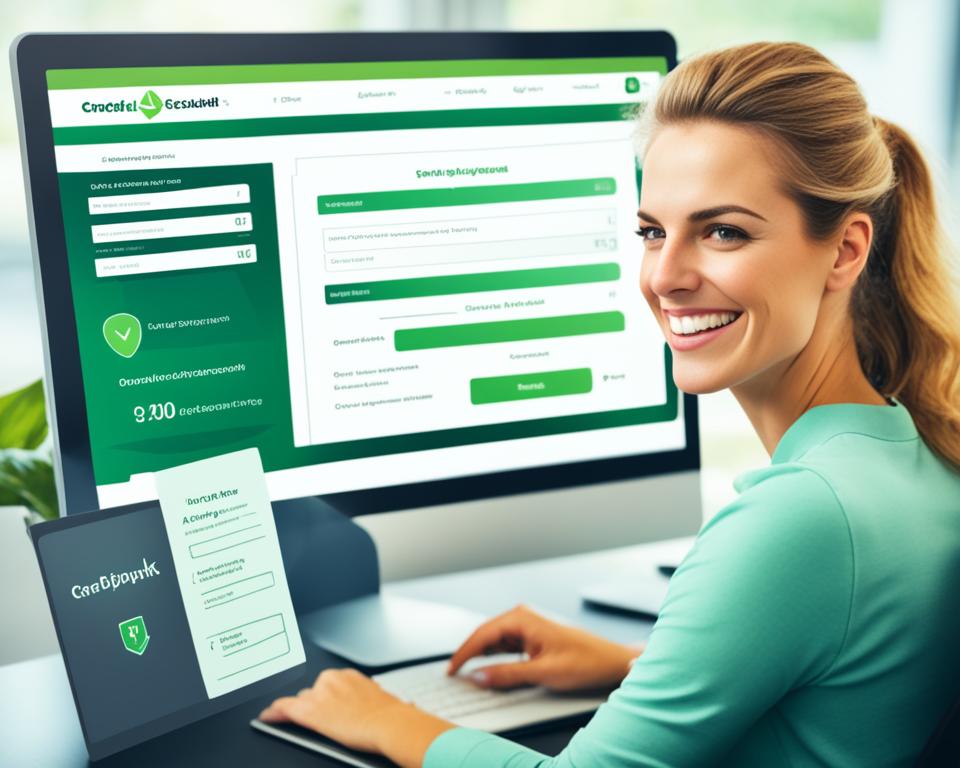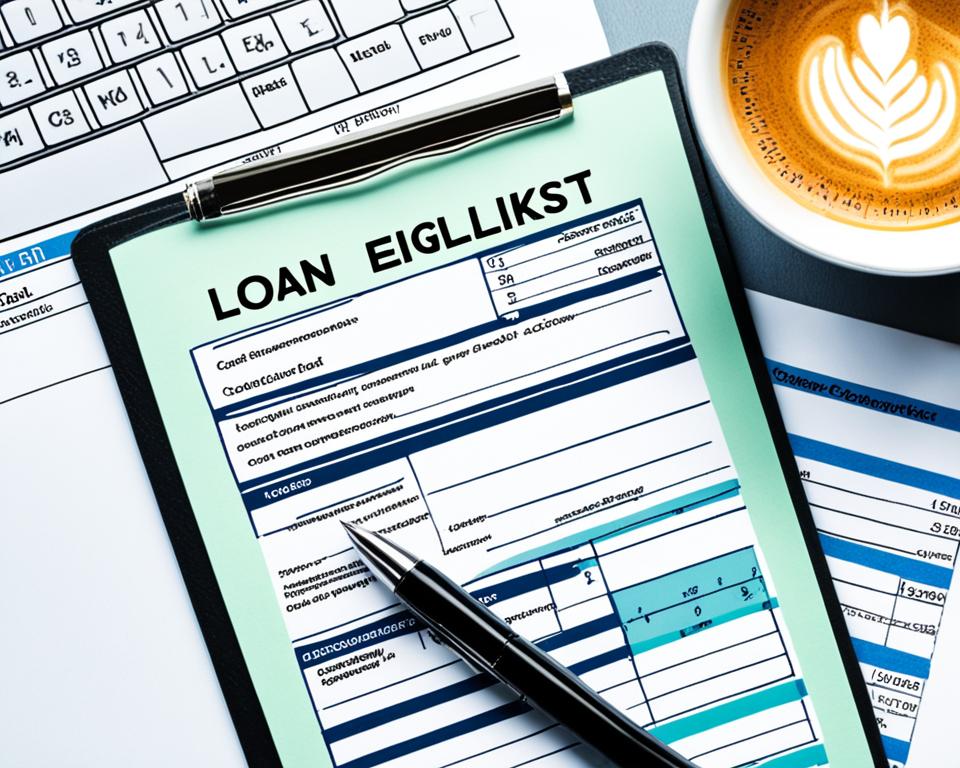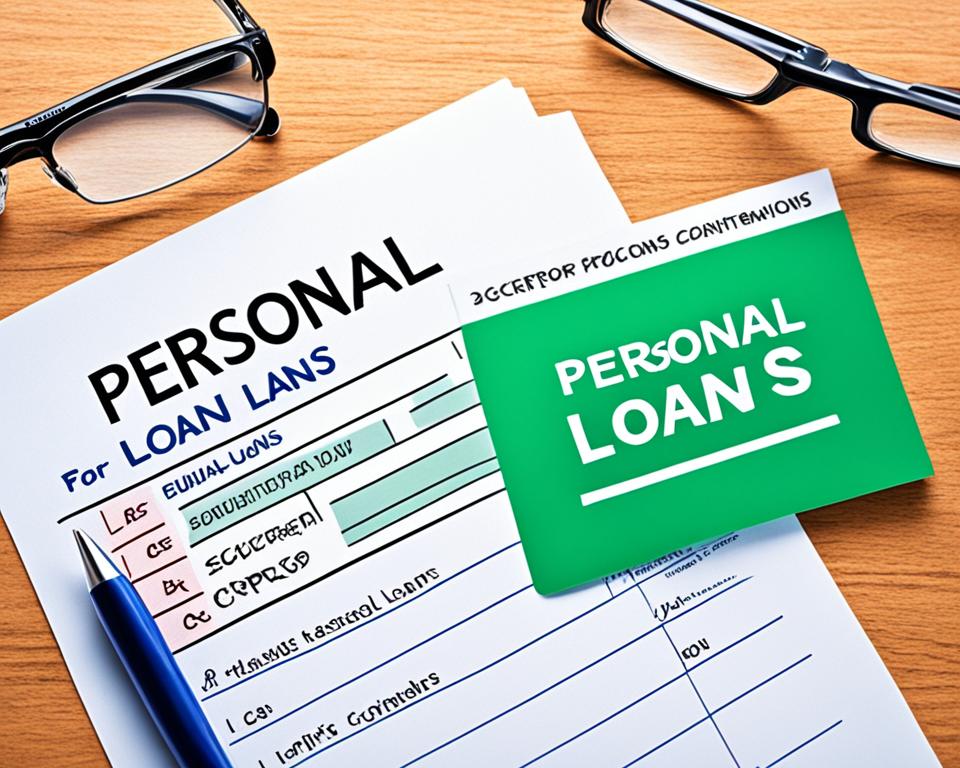Applying for a bank account online has never been easier. With just a few clicks, you can open a bank account from the comfort of your own home, saving you valuable time and effort. Most banks now offer online account opening options, allowing you to apply for a checking or savings account online in minutes.
When you apply for a bank account online, it’s important to note that approval is subject to each individual bank’s criteria. While most applications are approved swiftly, there may be cases where a bank denies an application based on factors such as past negative balances or suspected fraud issues.
Despite these considerations, the convenience and ease of opening a bank account online make it an attractive option for many individuals. Gone are the days of lengthy paperwork and waiting in line at a branch.
Key Takeaways:
- Applying for a bank account online is a quick and hassle-free process.
- Most banks offer online account opening options for checking and savings accounts.
- Approval for online applications is subject to individual bank criteria.
- Some banks may deny applications based on past negative balances or suspected fraud.
- Opening a bank account online saves you time and effort.
Who Can Open a Bank Account Online?
Most individuals are eligible to apply for a bank account online. However, each bank has its own policies and may have specific requirements for opening an account. Factors such as unpaid negative balances, involuntary account closures, or suspected fraud issues may result in a bank denying an application.
Some banks offer second-chance accounts for individuals who have been denied a checking account in the past, but these accounts may come with certain limitations and monthly fees.
Before applying for a bank account online, it’s essential to research the specific requirements of the bank you’re interested in to ensure a smooth application process. Keep in mind that providing accurate and honest information is crucial to avoid any complications or potential account denials.
Requirements for Opening a Bank Account Online
While eligibility requirements can vary between banks, here are some common documents and information you may need when applying for a bank account online:
- A valid government-issued ID, such as a driver’s license or passport, to verify your identity.
- Your Social Security number or Individual Taxpayer Identification Number (ITIN) for identification and tax purposes.
- A blank check, debit card, or credit card for the initial deposit.
- Personal contact information, including your email address, mailing address, and phone number.
It’s important to carefully read through the bank’s terms and conditions and understand any fees, minimum deposit requirements, or other account-specific details before proceeding with the application process.
| Bank | Eligibility Criteria | Additional Information |
|---|---|---|
| Bank A | – Must be at least 18 years old – No previous negative balances |
– Minimum deposit of $100 required |
| Bank B | – Must be a U.S. citizen or legal resident – No history of suspected fraud |
– Monthly maintenance fee of $5 |
| Bank C | – Must have a valid U.S. address – No recent involuntary account closures |
– No minimum deposit required |
These eligibility criteria and additional information are provided for illustrative purposes only and may vary. It’s essential to visit the respective bank’s website or contact their customer service for the most accurate and up-to-date information.
Opening a bank account online is a convenient way to manage your finances, but it’s crucial to understand the specific requirements and limitations set by each bank to ensure a successful application.
Can You Open a Bank Account Online for Free?
Many banks offer the convenience of opening a bank account online with no deposit requirement. However, it’s important to note that certain types of accounts may require an initial minimum deposit. Before applying, it’s crucial to understand the specific requirements of the account you’re interested in to avoid any unexpected fees or deposit obligations.
When opening an online bank account, you have various options for making the initial deposit. You can use a blank check, transfer money from another account, or use a credit or debit card. These methods provide flexibility and ease of funding your account.
“Opening a bank account online has never been easier. With just a few simple steps, you can have access to a wide range of banking services without any upfront costs.”
By exploring banks that offer free online bank accounts, you can take advantage of the convenience and flexibility provided by online banking without any financial barriers. Whether you’re looking for a basic checking account or a more comprehensive savings account, opening a bank account online can be a cost-effective way to manage your personal finances.
To give you a better idea of what to expect when opening a bank account online, here’s some information on the specific requirements:
| Account Type | Initial Minimum Deposit |
|---|---|
| Free Checking Account | No initial deposit required |
| High-Yield Savings Account | Varies by bank, typically ranging from $0 to $500 or more |
| Money Market Account | Varies by bank, typically ranging from $0 to $1,000 or more |
| Certificate of Deposit (CD) | Varies by bank, typically ranging from $0 to a specific minimum amount for the selected term |
Opening a bank account online can provide numerous advantages, such as the ability to manage your finances from the comfort of your home, access to online banking features, and the convenience of 24/7 account access. With the right bank and account type, you can open a bank account online for free and enjoy the benefits of online banking.
What Do You Need to Open a Bank Account Online?
When opening a bank account online, you will need to provide certain information and documents to verify your identity. This typically includes:
- A valid government-issued ID such as a driver’s license or passport
- Your Social Security number or Individual Taxpayer Identification Number (ITIN)
- A blank check, debit card, or credit card for the initial deposit
- Your email address, mailing address, and phone number
Each bank’s application process may vary, but these are the general requirements for opening a bank account online.
Why Do You Need to Provide this Information?
Banks require this information and documentation to ensure that the person opening the account is who they claim to be. Valid identification helps prevent identity theft and fraud. Your Social Security number or ITIN is used to verify your tax reporting information, and the initial deposit is needed to fund your account.
“Providing accurate and up-to-date information is crucial when opening a bank account online. It helps protect both your financial security and the bank’s system integrity.” – Bank Representative
By providing the necessary information and documents, you can confidently open a bank account online and enjoy the convenience of managing your finances through online banking.
| Information/Document | Purpose |
|---|---|
| Valid government-issued ID | To verify your identity |
| Social Security number or ITIN | To ensure accurate tax reporting |
| Blank check, debit card, or credit card | For the initial deposit to fund your account |
| Email address, mailing address, and phone number | To contact you and confirm your account details |
How to Open a Bank Account Online
Opening a bank account online is a simple process that can be completed in a few steps:
- Choose a bank: Research different banks and compare their account offerings, fees, and features to find the one that best suits your needs.
- Visit the bank’s website: Once you have chosen a bank, visit their website to start the account opening process. Look for a prominent “Open an Account” or “Apply Online” button.
- Provide the required information: Fill out the online application form with accurate and up-to-date information. This may include your personal details, such as your name, address, Social Security number, and date of birth.
- Verify your identity: To ensure security, most banks will require you to verify your identity. This can be done by providing a valid government-issued ID, such as a driver’s license or passport, and sometimes by answering security questions.
- Submit your application: Review all the information you have provided and submit your application. Make sure to read and understand any terms and conditions before proceeding.
- Make an initial deposit: Depending on the bank and account type, you may need to make an initial deposit. This can usually be done by transferring funds electronically from another account or by mailing a check or money order.
- Receive your account details: After your application is approved, you will receive your account details, such as your account number and online banking login information. Keep this information safe and secure.
Opening a bank account online saves you time and allows you to conveniently manage your finances from anywhere. With just a few simple steps, you can have a bank account up and running without the hassle of visiting a branch. Take advantage of this convenient option and start enjoying the benefits of online banking today.
If you need assistance or have any questions during the online account opening process, most banks provide customer support through phone, email, or live chat. They will be happy to guide you through the process and address any concerns you may have.

| Benefits of Opening a Bank Account Online |
|---|
| Convenience – Open an account from the comfort of your own home or anywhere with internet access. |
| Time-saving – Skip the hassle of commuting to a bank branch and waiting in line. |
| Flexibility – Access your account and manage your finances online at any time, day or night. |
| Security – Online banking platforms employ advanced security measures to protect your personal and financial information. |
| Easy access to account information – View your account balance, transaction history, and statements online. |
| Convenient account management – Transfer funds, pay bills, and set up automatic payments or savings goals with just a few clicks. |
Benefits of Online Banking
Online banking offers numerous benefits to account holders, making it a convenient and efficient way to manage your finances. Here are some of the key advantages:
- Convenience: With online banking, you have the flexibility to access and manage your bank account anytime, anywhere. Whether you’re at home, at work, or on the go, you can check your account balance, review transactions, transfer funds, and pay bills with just a few clicks.
- Time-saving: Online banking eliminates the need to visit a physical bank branch, saving you valuable time. Instead of waiting in long lines or dealing with paperwork, you can complete transactions and manage your accounts online, ensuring a quick and hassle-free experience.
- 24/7 Availability: Unlike traditional banking hours, online banking is available 24/7. This means you can conduct your banking activities at any time that suits you, even during weekends and holidays.
- Secure Transactions: Banks employ advanced security measures to protect your personal and financial information online. Encryption technology ensures that your data is encrypted and remains confidential during every transaction.
- Financial Management Tools: Many online banking platforms offer helpful financial management tools to assist you in budgeting and tracking your expenses. You can set up alerts and notifications to stay informed about your account activity and manage your budget effectively.
Experience the convenience and flexibility of online banking by opening a bank account online today. Discover the advantages it offers in simplifying your financial life.
Closing a Bank Account Online
Closing a bank account online is a convenient option for account holders looking to terminate their banking relationship efficiently. While the process may vary depending on the bank, following the necessary steps ensures a smooth account closure. Here’s what you need to know:
- Gather account information: Before initiating the closure process, gather all the necessary information related to your account. This may include your account number, any relevant identification documents, and any outstanding transactions.
- Review the bank’s policy: Visit the bank’s official website and review their specific policy on closing bank accounts. This information is often available in the account-related FAQs or customer support section. Understanding the bank’s requirements and any associated fees or procedures will help you prepare for the closure process.
- Initiate closure online: Most banks provide an online platform or feature within their internet banking portal to initiate the account closure. Look for options like “Close Account” or “Account Services” in your online banking dashboard. Click on the relevant link and follow the on-screen instructions to begin the closure process.
- Follow additional instructions: During the closure process, the bank may require you to complete additional steps or provide specific information. These instructions may include returning any remaining checks or debit cards, transferring funds to another account, or confirming your closure request through a separate means of communication.
- Confirm closure: Once you have completed all the necessary steps, the bank will typically send you a confirmation of your account closure via email, mail, or within your online banking messaging system. Keep this confirmation for your records.
It’s important to note that some banks may require you to call or visit a branch to discuss the account closure in person. If this is the case, follow the instructions provided by the bank and schedule an appointment if necessary.
Closing your bank account online provides a convenient option for terminating your banking relationship without the need for in-person visits or prolonged telephone conversations. By following the bank’s instructions and completing any required steps, you can ensure a smooth account closure.
Types of Bank Accounts
When it comes to bank accounts, there are several options available to meet your financial needs. Different accounts offer distinct features and benefits that cater to specific uses and goals. Understanding the types of bank accounts available can help you make informed decisions about managing your money. Below are some common types of bank accounts:
1. Checking Account
A checking account is a basic transactional account that allows you to manage your day-to-day finances. It provides easy access to your funds through checks, debit cards, and online banking. With a checking account, you can make deposits, write checks, and make electronic transfers, making it convenient for paying bills and managing expenses.
2. Savings Account
A savings account is designed to help you save money over time. It typically offers higher interest rates than a checking account. With a savings account, you can deposit money and earn interest on your balance. It’s a great account for building an emergency fund or saving for future goals like a down payment on a house or a dream vacation.
3. Money Market Account
A money market account is a type of savings account that usually offers higher interest rates than a regular savings account. It provides a combination of savings and checking features, allowing you to earn interest on your balance while still having access to funds through checks or a debit card. Money market accounts often have minimum balance requirements.
4. Certificate of Deposit (CD)
A certificate of deposit, or CD, is a time deposit account with a fixed term and an agreed-upon interest rate. CDs typically offer higher interest rates than regular savings accounts. You deposit a specific amount of money into the account for a specified term, ranging from a few months to several years. In return, you earn interest on the deposited amount. CDs usually have penalties for withdrawing funds before the maturity date.
Each type of bank account serves a different purpose, and choosing the right accounts for your specific financial needs is crucial. Consider your short-term and long-term goals, liquidity requirements, and interest rate preferences when deciding which accounts to open.
Special Account Programs
Some banks offer special account programs with added benefits for specific groups. These programs are designed to cater to the unique needs of certain individuals, such as military personnel and students.
Military Banking Benefits
Military banking benefits are designed to provide financial support and convenience to active-duty military members, veterans, and their families. These benefits often include:
- Specialized checking and savings accounts
- Waived fees for ATM usage
- Discounted loan interest rates
- Financial planning and education resources
By offering these benefits, banks aim to assist military personnel in managing their finances effectively and maximizing their savings.
Student Banking
Student banking programs are tailored to meet the needs of students who are in college or university. These programs often offer the following benefits:
- No monthly maintenance fees
- Low or no minimum balance requirements
- Free or discounted ATM withdrawals
- Financial literacy resources
Student banking programs help students build a strong financial foundation while they focus on their education.
Comparison of Military Banking Benefits and Student Banking
| Benefits | Military Banking | Student Banking |
|---|---|---|
| Specialized Accounts | Available | Available |
| ATM Fee Waivers | Available | Some banks offer |
| Discounted Loan Interest Rates | Available | Not applicable |
| Financial Planning Resources | Available | Not applicable |
| No Monthly Maintenance Fees | Not applicable | Available |
| Low or No Minimum Balance Requirements | Not applicable | Available |
| Free or Discounted ATM Withdrawals | Not applicable | Available |
| Financial Literacy Resources | Not applicable | Available |
Conclusion
Online banking has revolutionized the way we manage our finances, providing convenience, flexibility, and a range of banking options. With the ability to apply for a bank account online, the process has become quick and straightforward. It’s important to understand each bank’s requirements and policies, ensuring a smooth account opening experience.
By following the steps outlined in this article, you can easily open a bank account online and access the benefits of online banking for efficient money management. Remember to keep your account information secure and take advantage of the various features and tools available to make the most of your online banking experience.
Whether you’re looking to open a checking account for everyday transactions or a savings account to grow your funds, applying for a bank account online is a convenient and efficient way to get started. Take the time to research banks, compare their offerings, and choose the best account that suits your financial needs. Embrace the digital era of banking and enjoy the ease and flexibility of online banking today.
FAQ
Can I apply for a bank account online?
Yes, applying for a bank account online has become a convenient and straightforward process. Most banks offer online account opening options, allowing you to apply for a checking or savings account online in minutes.
Who is eligible to open a bank account online?
Most individuals are eligible to apply for a bank account online. However, each bank has its own policies and may have specific requirements for opening an account.
Can I open a bank account online for free?
Some banks offer free online bank accounts with no deposit requirement. However, depending on the type of account you choose, some banks may require an initial minimum deposit.
What information and documents do I need to open a bank account online?
When opening a bank account online, you will need to provide certain information and documents to verify your identity. This typically includes a valid government-issued ID, your Social Security number or Individual Taxpayer Identification Number (ITIN), and a blank check, debit card, or credit card for the initial deposit.
How do I open a bank account online?
Opening a bank account online is a simple process that can be completed in a few steps. You will need to select the type of account you want, provide the necessary information and documents, review and agree to the terms and conditions, and make the initial deposit.
What are the benefits of online banking?
Online banking offers numerous benefits to account holders, including convenience, 24/7 access to account information, the ability to manage finances from anywhere, online bill payment, and the option to set up automatic transfers and alerts.
Can I close a bank account online?
Yes, closing a bank account online is possible, but the process may vary depending on the bank. It is recommended to review the bank’s specific policy on account closures, which can usually be found on their official website.
What are the different types of bank accounts?
There are different types of bank accounts to suit different needs, including checking accounts, savings accounts, money market accounts, and certificates of deposit (CDs).
Are there any special account programs available?
Some banks offer special account programs with added benefits for specific groups, such as military banking benefits for members of the armed forces and student banking programs for students.
How can online banking benefit me?
Online banking has revolutionized the way we manage our finances, providing convenience, flexibility, and a range of banking options. By applying for a bank account online, you can access the benefits of online banking for efficient money management.





